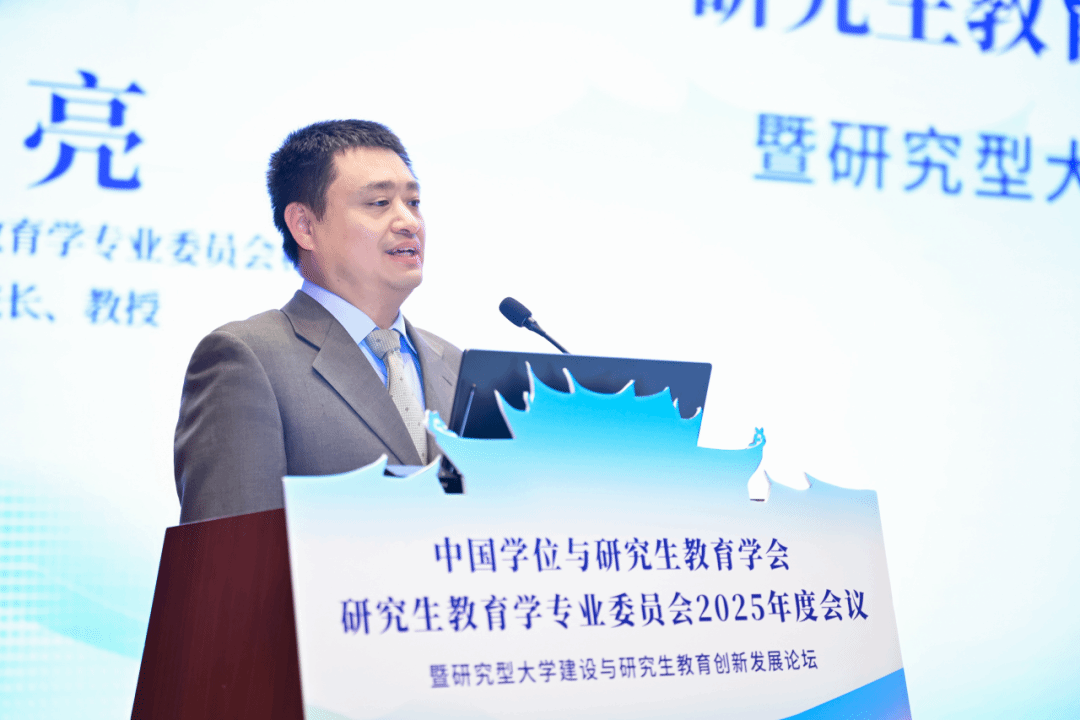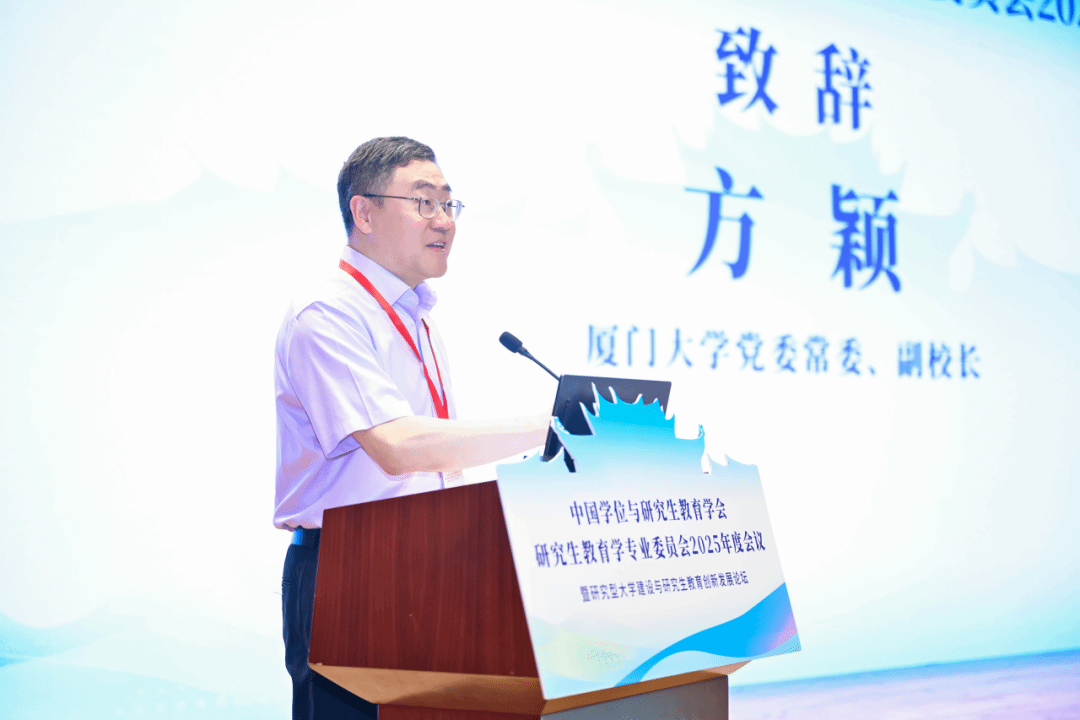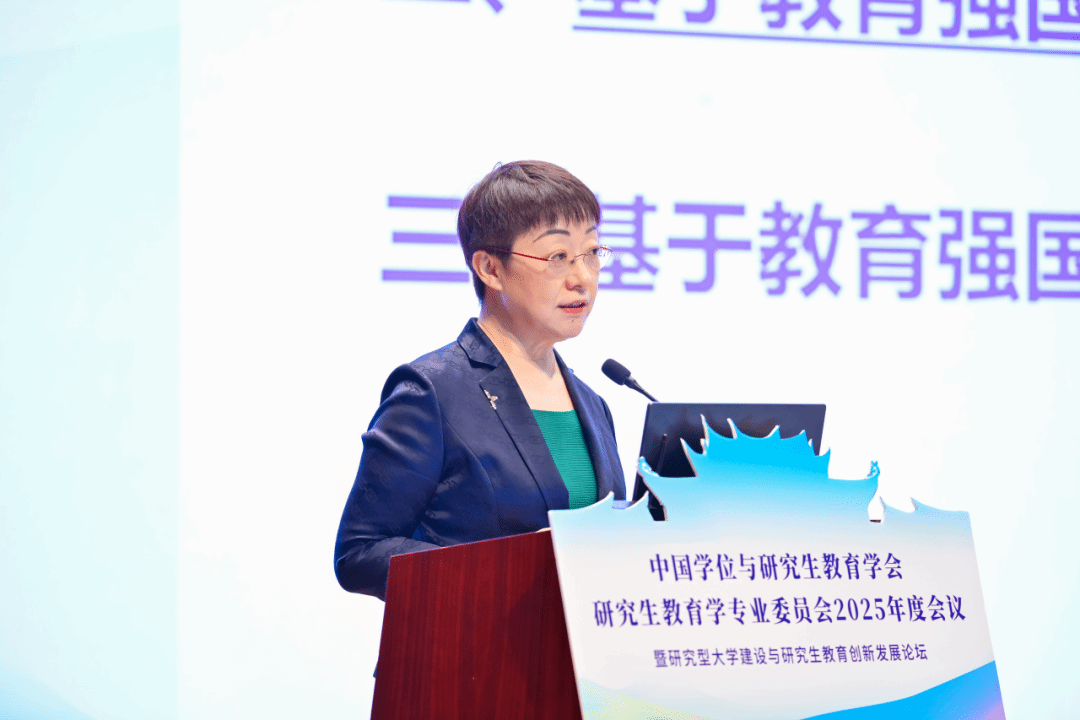On May 16-17, 2025, the 2025 Annual Conference of the Professional Committee of Education of the Association of Chinese Graduate Education together with the Forum on Research-University Development and Graduate-Education Innovation was successfully held at Xiamen University’s Science & Arts Centre. The event was co-organized by Annual Conference of the Professional Committee of Education of the Association of Chinese Graduate Education, the Association’s Membership Department, Degree & Graduate Education journal, Graduate Education Research journal, Xiamen University’s Institute of Education, and Tsinghua University’s Graduate School of Education, and hosted by Xiamen University’s Institute for Higher Education Research and the Fujian Institute for Higher Education. The event brought together more than 600 university leaders, scholars and graduate students from nearly 200 institutions nationwide to chart innovative pathways for graduate education against the backdrop of building China into an education powerhouse. An additional of 8,000 participants joined online.

The opening ceremony was presided over by Professor Li Fengliang, Secretary-General of the Research and Education Committee and Vice Dean of the School of Education at Tsinghua University. The event was attended by the following distinguished guests: Professor Fang Ying, who is a Member of the Party Committee Standing Committee and Vice President of Xiamen University. Research Fellow Zhang Shulin, serving as Vice President of the Association of Chinese Graduate Education and former Vice President of the University of Science and Technology of China. Professor Wang Zhanjun, Vice President of the Association and Director of the Research Center for Graduate Education at Beijing Institute of Technology. Wang Lisheng, Vice Chairman of the China Association for Non-Government Education and Chair of its Higher Education Committee, as well as the former Director of the Degree and Graduate Education Development Center of the Ministry of Education. Researcher Liu Huiqin, Party Secretary of the Shenzhen International Graduate School of Tsinghua University.



In his address, Vice President Fang Ying emphasized that graduate education, as a strategic priority in building an education powerhouse, must address key challenges such as balancing scale with quality, optimizing a classified training system for different types of graduates, and enhancing the innovative capabilities of doctoral students to cultivate a high-level talent ecosystem. Drawing on a century of accumulated academic strength and orienting itself toward national strategic needs, Xiamen University is deepening its graduate education reform through a multi-faceted approach. Key initiatives include forging an integrated system for Bachelor’s to PhD training and piloting discipline-specific evaluations that distinguish between academic and professional program. Furthermore, the university is globalizing graduate training with tailor-made international curricula and establishing a College of Distinguished Engineers under a unique “four-shared, four-linked” university-industry mechanism. These efforts are complemented by a consistent strengthening of process management and mentor development across all graduate program. The Institute of Higher Education, building upon the profound intellectual legacy of its founding scholar Pan Maoyuan, is dedicated to cultivating first-rate graduate students in the field of education. Guided by this commitment, the Institute has developed a unique educational framework featuring an “interdisciplinary-international-integrated” curriculum that spans master’s and doctoral studies, alongside a “theory-survey-innovation” practicum model. This integrated framework is designed to foster a quality culture characterized by solid foundations, self-driven inquiry, and trend-setting research. Together, these initiatives lay a firm foundation for achieving the Institute’s ultimate goal: nurturing innovative talent in education that is deeply rooted in the context of China. As an important practitioner of the reform of national graduate-education, Xiamen University is now advancing an “organized-research plus full-chain cultivation” model centered on new platforms such as the College of Distinguished Engineers to tighten the coupling of education, innovation and talent chains and thereby make a still greater contribution to Chinese-style modernization.

On behalf of the Association of Chinese Graduate Education, Vice-President Zhang Shulin extended warm congratulations on the convening of the conference. In her address she stressed that graduate education represents the apex of the national education system and a key marker of China’s core competitiveness; as the vanguard of the drive to build an education powerhouse, universities must heighten their sense of mission and convert the Education Powerhouse Development Plan (2024-2035) into concrete outcomes that propel high-quality growth in graduate education.

In the speech of Director Liu Huiqin, she reviewed the accomplishments achieved by the Graduate Education Committee over the past year. She highlighted that the Committee has successfully launched a series of strategic, theoretical, and applied research initiatives. Furthermore, the Committee collaborated with multiple stakeholders to establish an annual academic forum, providing a sustainable platform for exchange. It also actively promoted the founding of graduate-education research centers, as well as master’s and doctoral program in graduate-education studies. She stressed that graduate education is a national strategic priority, and that research in this field bears the heavy responsibility of sustaining its high-quality development. Therefore, greater emphasis must be placed on policy-oriented and applied research.

To advance this mission, the Committee will next urge graduate schools and their affiliated colleges or institutes of education to jointly establish research centers. It will also encourage qualified universities to develop graduate education studies as a distinct sub-discipline and press for its formal inclusion in the national catalogue of academic disciplines. These steps aim to create more favorable conditions for the flourishing of graduate-education research.
Centering on “building research universities and innovating graduate education,” the forum focused on graduate education’s role in first-rate construction, the differentiated development of academic and professional programmes, internationalisation for high-quality growth, doctoral training and the cultivation of top-notch innovators, and the emergence of innovative research universities. Presentations spanned AI-driven innovation in graduate education, industry-education integration, interdisciplinary collaboration, advisor-advisee relations, doctoral graduates’ employment, and graduate education in private institutions. Participants agreed that the conference, moving from theory to practice, macro to micro, and domestic to global perspectives, comprehensively examined the challenges, missions and tasks facing graduate education in the new era, offered a wealth of constructive ideas, and generated valuable intellectual capital for turning China into a graduate-education powerhouse and, by extension, an education powerhouse.
In the closing remarks of Professor Bao Wei, Director of Xiamen University’s Research Center for Higher Education Development, she noted that the forum had convened research forces from across the nation to jointly interrogate the developmental logic of China’s graduate-education reform against the backdrop of a new era. The rich and multi-layered agenda fully reflected the theoretical vitality and problem-orientation that currently characterize graduate-education research in China.
The Xiamen University higher-education research team, she pledged, will continue to foster scholarly dialogue, policy studies and cross-boundary collaboration, supplying sustained theoretical support and intellectual resources for the high-quality development of graduate education and advancing unswervingly along the road toward building a graduate-education support to develop our country.

In her closing remarks, Director Liu Huiqin fully affirmed the fruitful outcomes achieved by the conference. She emphasized that the Association of Chinese Graduate Education will continue to collaborate with universities across the country to build dedicated research and exchange platforms for graduate education. Through these efforts, the Committee aims to facilitate the sharing of findings, stimulate new ideas, and inspire innovation. This ongoing work is intended to advance both the disciplinary development of graduate education studies and support the high-quality growth of graduate education itself. She announced that next year’s annual meeting will be held at Huazhong University of Science and Technology and invited everyone to gather in Wuhan for communication.

Text: By Liu Xuejun, Lin Hanyan
Image: By Zhuang Hua
Translated by:Dai Lan